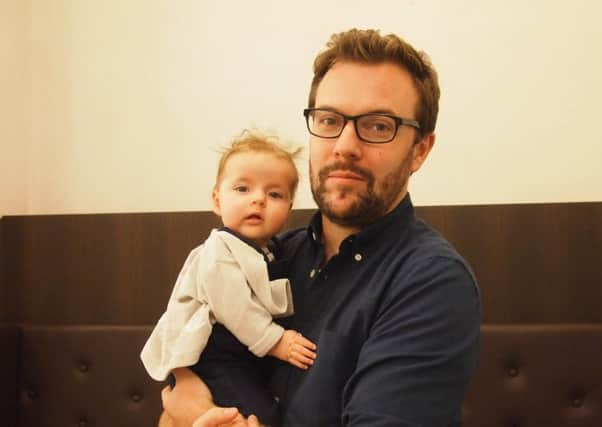genetic cancer risk test


An estimated 14,227 people living in Yorkshire have an inherited genetic condition called Lynch syndrome that increases their risk of developing bowel cancer by up to 80 per cent.
But very few people with Lynch syndrome know they have it, and this means they are missing out on regular tests that can identify early signs of cancer.
Advertisement
Hide AdAdvertisement
Hide AdAs part of a £1.5m region-wide bowel cancer improvement programme, Yorkshire Cancer Research is now temporarily offering tumour testing for bowel cancer patients living in the region.
So far, samples from more than 800 bowel cancer patients have been sent to pathologists at the University of Leeds, led by Professor Phil Quirke, to be screened for signs of Lynch syndrome.
So far, 20 bowel cancer patients tested by Yorkshire Cancer Research have shown signs of having Lynch syndrome.
Sam Lingard from Embsay, near Skipton, decided to be tested for Lynch syndrome four years ago after his father, Nigel, tested positive for the condition.
Advertisement
Hide AdAdvertisement
Hide AdNigel had been treated for bowel cancer in his small intestine at the age of 46 in 1999.
When Sam’s great aunt began researching the family history, it became clear that Lynch syndrome might be a possibility.
Nigel’s brother – Sam’s uncle – tested negative, but doctors confirmed that both Sam and his brother did have the genetic fault.
“My grandfather died from cancer, and his brothers and sisters all had various cancers as well. We started speaking to doctors and nurses, and everything pointed to a family history of Lynch syndrome.” Sam, 36, explains.
Advertisement
Hide AdAdvertisement
Hide Ad“If one of your parents has Lynch syndrome, you have a 50/50 chance of inheriting the faulty gene, so both my brother and I chose to get tested. It never crossed my mind not to do it. While waiting for the results, I did go through my character traits and whether I looked more like my mum or my dad. None of that applies, but you do start to think about things like that.
“When I found out I did have Lynch syndrome, I was obviously disappointed, but it didn’t significantly affect me. I was pleased that I knew where I stood and was therefore getting the right investigation and treatment. It was a very positive endeavour.”
People with Lynch syndrome are usually diagnosed with bowel cancer at an early age. Bowel cancer that is not genetic tends to be diagnosed in people aged over 50.
Since older people are more likely to get bowel cancer, the current national NHS screening programme, involving a home testing kit, is only available to those aged 60 to 74.
Advertisement
Hide AdAdvertisement
Hide AdAnother type of test, known as bowel scope screening, is available in some areas to people aged over 55.
At just 46, Sam’s father Nigel was younger than the average bowel cancer patient, and, at first, he was misdiagnosed with other illnesses. This meant that his cancer was found at a late stage, and he was lucky to be treated successfully.
Thanks to regular testing following his diagnosis with Lynch syndrome, a second tumour was discovered in Nigel’s large intestine. This time, the cancer was not as serious, and following surgery he once again made a full recovery.
“It took a long time for my dad to be diagnosed the first time. He wasn’t able to eat, lost weight and was often sick. The doctors and consultants kept treating him for other stomach conditions because bowel cancer didn’t seem like a likely possibility.
Advertisement
Hide AdAdvertisement
Hide Ad“Now, I’m aware of the symptoms and would be alerted to them, and my doctor would be as well. Having regular colonoscopies also sets your mind at rest.
“The first time you have one of those tests it’s not very nice, but it’s not the end of the world. Compared to the benefits you get from knowing you don’t have cancer it really is a small price to pay.
“We were probably at the forefront of Lynch syndrome testing and we feel lucky to have been able to take part in this important screening,” Sam adds.
“I have two young children and when they reach the age of 18, if they choose to, they will be able to have the test done and undergo regular investigations if they need to. I’m very supportive of the scheme, and the funding being offered by Yorkshire Cancer Research.
“Bowel cancer is treatable if it’s caught at an early stage.
“I think there needs to be more awareness of Lynch syndrome, not just among the general public but also among GPs.”